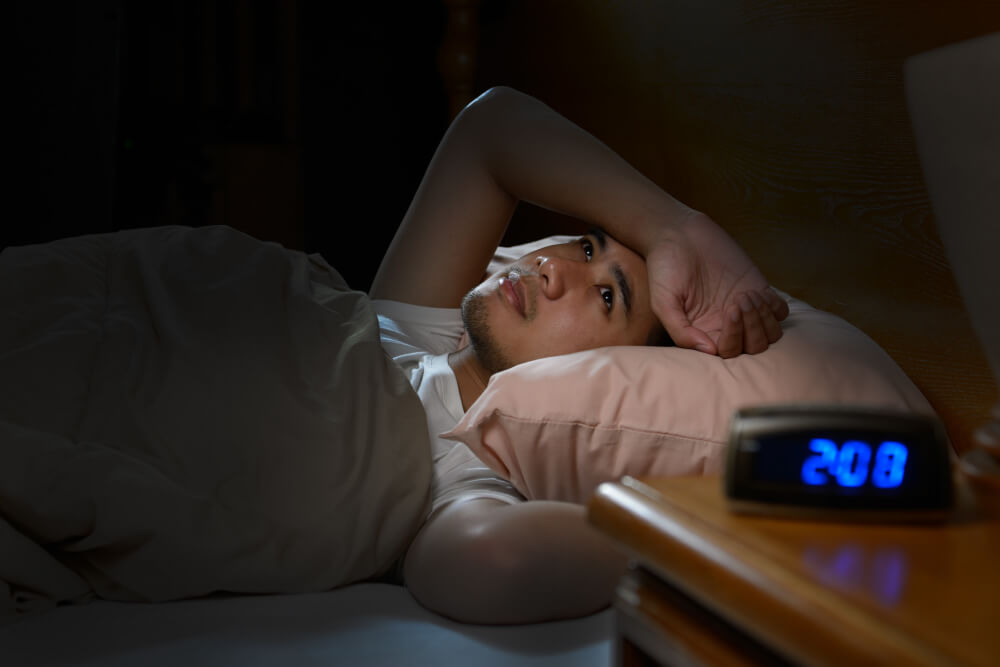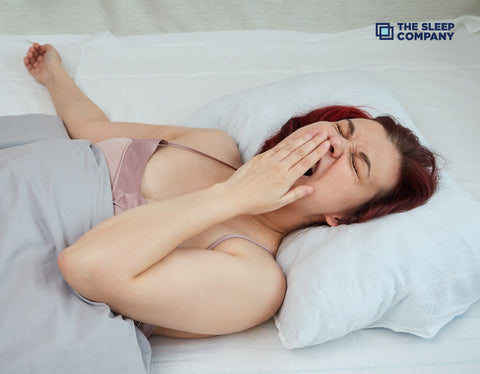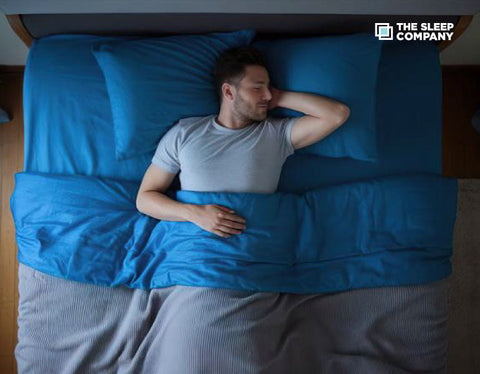My Cart

Tired but Not Sleepy? Here Are the Reasons

Nothing is more infuriating than being tired yet having difficulty falling asleep. A bad night’s sleep can cause fatigue, agitation, and worry the next day, quickly becoming a dangerous cycle of additional stress and insomnia.
You may be tired yet fail to sleep for a plethora of reasons. Understanding and identifying these factors is a critical initial step in improving your sleep hygiene and overall health.
Difference between tired, fatigued, and sleepy
Many people confuse the terms “tired,” “sleepy,” and “fatigued,” but there is a distinction.
For example, you may feel tired after completing a race. You probably won’t feel motivated or have the energy to run another one, much alone walk the distance to your vehicle.
However, this does not imply that you are sleepy. Otherwise, you’ll fall asleep on the grass beyond the finish line. Rather, being sleepy means struggling to stay awake.
Why am I tired but fail to sleep at night?

There are various reasons why you are weary yet not getting enough quality sleep at night.
Here are the reasons why you don’t sleep even if you’ve been tired all day.
Napping
Naps aren’t necessarily harmful and offer a number of health advantages. However, a poor napping might keep you awake when you should be sleeping. According to research, long naps and sleeping later in the afternoon might lead you to take longer to fall asleep at night, sleep badly, and wake up more frequently.
It is best to keep naps 20-30 minutes long and take them at the same time every day so your body becomes accustomed to them.
Stress and anxiety
Stress and worry are the most significant impediments to obtaining enough sleep. Mental hyperarousal, dwelling on the past, and ruminating about the future are all serious anxiety symptoms that keep many individuals up at night.
Anxiety attacks throughout the night interrupt your 24-hour cycle by altering your circadian rhythm. Even if you’re exhausted, the quicker your thoughts race, the more alert you become.
Depression
Unlike stress and worry, depression affects your sleep quality differently. It lowers your mood, causes exhaustion, and disrupts your sleep.
When you are depressed, your demean or is altered, which causes worry and tension, keeping you up at night with incessant thoughts about the past, present, and future.
Caffeine
Caffeine is a popular stimulant that stays in your system for 6-8 hours after consumption. Despite being weary and unable to sleep, drinking coffee or caffeine-containing beverages late in the day accelerates your brain activity at night.
Caffeine has been linked to increased REM sleep, poor sleep efficiency, reduced total sleep time and worsened sleep quality.
Blue screen
Screens and electronic gadgets generate blue light, suppressing the synthesis of melatonin, your sleep hormone. The blue light from the devices affects your internal circadian rhythm, which uses light and darkness signals to figure out when you sleep and wake.
It confuses your brain into believing it should be awake, making you feel invigorated even when you are asleep. Also, the stuff you see online might be stimulating and cause your brain to become active.
Mattress
Low-quality mattresses can have an impact on your body, joints, and pressure points, leading you to toss and turn all night despite being tired and exhausted.
Sleeping on old and worn-out mattresses with broken springs and coils can be uncomfortable and risky.
Its potential to absorb body heat can also produce night sweats, shortness of breath, and sleep disruption.
Diet
Sleep quality is directly related to your eating habits, quantity, and type of food. Eating close to bedtime might result in inflammation, acidity, indigestion, and other dietary issues that keep you awake at night.
Eating melatonin-rich foods such as nuts, dairy products, and fatty fish helps you sleep better than foods such as chocolate, spicy foods, and sugar-laden foods.
How to fall asleep?

The main hindrance to sleep is when your mind associates your bed with anxiety. So when you go to bed, you feel alert or unable to sleep. And when you spend maximum time in your bed feeling negative about sleep, your body begins to feel in danger and keeps you awake.
In this case, you must establish and maintain specific sleep-inducing routines in your life in order to improve your sleep quality.
Here are some sleep practices that will help you fall asleep on time and sleep through the night without interruption, whether you are exhausted or not.
Sleep routine
It is best to develop a sleep regime and stick to it when you fail to sleep at night. Having a regular sleep-wake time helps your brain automatically create hormones required for the activity.
Start a pre-bed routine like meditation, mindfulness, reading, and listening to music. Regular pre-bed exercise helps your brain associate these activities with sleep and makes you sleepy as you begin them.
Bedroom environment
Your surroundings matter for better sleep quality. Make sure that you create a relevant atmosphere in your sleeping place or bedroom. Such as,
- Turn off all lights, including mobile and television.
- Lower room temperature with the help of a fan, aircon, or keeping windows open
- Use white noise or pink noise at a low volume to help you relax and fall asleep
- Use room freshener to cancel any stingy and dampened smell in the room
- Use clean and neat linens like bedsheets, pillow covers, comforters, window curtains, etc.
Change mattress
A comfortable and supportive mattress is necessary to maintain body alignment and avoid pain and injuries during sleep. Therefore, use a mattress with good quality, breathable material, enough firmness, proper height, and size suitable to your body.
The Sleep Company’s patented Japanese SmartGRID mattresses are excellent choices when it comes to providing the best of both worlds: comfort and support.
Follow diet
Your diet is also important to avoid any disruptions in sleep at night. Therefore, ensure that you eat nutritious food that induces sleep hormones, and avoid eating heavy meals before bedtime.
Bottom line:
It is indeed difficult not to be able to sleep despite being tired all day. It not only hampers your one day but your overall existence. To avoid these sleepless nights, following the tips mentioned above are really helpful.
However, if they don’t work, visiting your doctor and taking their advice is necessary.


































































